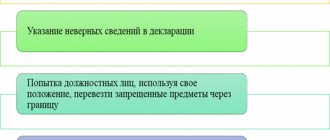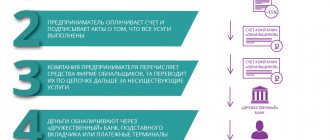New edition of Art. 174 of the Criminal Code of the Russian Federation
1. Carrying out financial transactions and other transactions with funds or other property knowingly acquired by other persons through criminal means, in order to give legal form to the possession, use and disposal of said funds or other property -
shall be punishable by a fine in the amount of up to one hundred twenty thousand rubles or in the amount of the wages or other income of the convicted person for a period of up to one year.
2. The same act committed on a large scale -
shall be punishable by a fine in the amount of up to two hundred thousand rubles, or in the amount of the wages or other income of the convicted person for a period of one to two years, or by forced labor for a term of up to two years, or by imprisonment for a term of up to two years with a fine of up to fifty thousand rubles or in the amount of wages or other income of the convicted person for a period of up to three months or without it.
3. Acts provided for in part one or two of this article, committed:
a) by a group of persons by prior conspiracy;
b) by a person using his official position, -
shall be punishable by forced labor for a term of up to three years with or without restriction of freedom for a term of up to two years and with deprivation of the right to hold certain positions or engage in certain activities for a term of up to three years or without it, or with imprisonment for a term of up to five years with a fine in the amount up to five hundred thousand rubles or in the amount of wages or other income of the convicted person for a period of up to three years or without it, with or without restriction of freedom for a term of up to two years and with deprivation of the right to hold certain positions or engage in certain activities for a period of up to three years or without one.
4. Acts provided for in part one or three of this article, committed:
a) an organized group;
b) on an especially large scale, -
shall be punishable by forced labor for a term of up to five years with or without restriction of freedom for a term of up to two years and with deprivation of the right to hold certain positions or engage in certain activities for a term of up to three years or without it, or with imprisonment for a term of up to seven years with a fine in the amount up to one million rubles or in the amount of wages or other income of the convicted person for a period of up to five years or without it, with or without restriction of freedom for a term of up to two years and with deprivation of the right to hold certain positions or engage in certain activities for a period of up to five years or without one.
Note. In this article and Article 174.1 of this Code, financial transactions and other transactions with funds or other property carried out on a large scale are recognized as financial transactions and other transactions with funds or other property carried out in an amount exceeding one million five hundred thousand rubles, and in an especially large amount - six million rubles.
What is meant by money laundering?
Money laundering is the transfer of funds from the shadow economy to the official and legal one. The person tries to give the income legitimacy in order to be able to dispose of it calmly.
Initially, money comes to a citizen through criminal means as a result of fraudulent schemes, robbery, drug and weapons trafficking, and theft. Then they are transferred from cash to non-cash form, exchanged for gold, real estate, securities and again transferred to non-cash form.
Types of legalization (laundering) of funds
There are hundreds of money laundering schemes. They are being improved every day, which makes it more difficult to investigate and prove a crime.
Let's look at examples of some of them:
- creation of shell companies to carry out transactions with large sums;
- falsification of primary documentation to substantiate the legality of the source of income obtained by criminal means;
- conducting transactions through companies owned by relatives;
- withdrawal of funds to offshore zones with preferential taxation.
Responsibility arises only when the money is acquired illegally.
If you are suspected of money laundering, it is advisable to immediately enlist the help of a qualified lawyer. He will help confirm the legality of sources of income and tell you how to prove the absence of a crime.
Signs of legalization of funds or other property
Income legalization is a complex process that involves many transactions. To qualify an act as a crime, it must have the following characteristics:
- legalization is carried out in order to hide traces of the origin of money obtained by criminal means;
- criminals create the appearance of legality in obtaining income;
- persons receiving illegal income try to hide;
- conditions are created for tax evasion and ensuring convenient legal access to funds.
To qualify a crime under Article 174 of the Criminal Code of the Russian Federation, the amount of damage caused is taken into account. Penalties are provided for the following offenses:
- simple;
- on a large scale – from RUB 1,000,000;
- in especially large amounts - from RUB 6,000,000.
Legalization (laundering) of money acquired by criminal means is detected in any, even targeted financial transaction or operation with money or other property.
Criminal liability for legalization of proceeds from crime
December 30, 2020
The Criminal Code of the Russian Federation (hereinafter referred to as the Criminal Code of the Russian Federation) establishes criminal liability for the legalization of funds or other property knowingly acquired by other persons through criminal means, for the legalization of funds or other property acquired by a person as a result of committing a crime, and for the acquisition or sale of property , knowingly obtained by criminal means (Articles 174, 174.1 and 175 of the Criminal Code of the Russian Federation), the sanctions of these articles provide for punishment of up to 7 years in prison.
In accordance with the explanation contained in the resolution of the Plenum of the Supreme Court of the Russian Federation dated July 7, 2015 No. 32 “On judicial practice in cases of legalization (laundering) of funds or other property acquired by criminal means, and on the acquisition or sale of property knowingly obtained by criminal means by" liability under Article 174 or Article 174.1 of the Criminal Code of the Russian Federation also occurs when committing one financial transaction or transaction with funds or other property acquired by criminal means (as a result of committing a crime), if it is established that such an act was committed with the aim of giving lawful type of possession, use and disposal of the specified funds or other property (for example, concluding a purchase and sale agreement for a real estate property, the criminal acquisition of which is masked by deliberately forged documents on the ownership of this object).
The purpose of giving legal form to the possession, use and disposal of funds or other property acquired by criminal means (as a result of committing a crime) can be established on the basis of the factual circumstances of the case, indicating the nature of the financial transactions or transactions performed, as well as other actions associated with them the guilty person and his accomplices, aimed at concealing the fact of the criminal acquisition of property and ensuring the possibility of its free circulation.
The provisions of Articles 174 and 174.1 of the Criminal Code of the Russian Federation, which establish criminal punishment for two identical crimes, but with different subjects.
Article 174 of the Criminal Code of the Russian Federation establishes punishment for persons who, in essence, are intermediaries or perpetrators of money laundering, while not having an actual and direct relationship with these assets.
Article 174.1 of the Criminal Code of the Russian Federation establishes punishment for persons who criminally launder funds obtained by these persons themselves through criminal means.
The sanction for committing these crimes provides for punishment in the form of a fine in the amount of up to 120,000 rubles or wages (other income) of the convicted person for a period of up to one year (part one of Article 174 or 174.1 of the Criminal Code of the Russian Federation).
The second part of these articles provides for liability for the same actions committed in relation to funds or property on a large scale, which, by virtue of the note to Article 174 of the Criminal Code of the Russian Federation, is set in an amount exceeding 1,500,000 rubles. The sanction for such actions provides for a maximum penalty of imprisonment for a term of up to 2 years with a fine of up to 50,000 rubles or wages (other income) of the convicted person for a period of up to three months or without it.
Legalization committed as part of a group of persons by prior conspiracy or by a person using his official position provides for punishment in the form of imprisonment for a term of up to 5 years, with possible additional types of punishment in the form of a fine in the amount of up to 500,000 rubles or salary (other income for a period up to three years, restriction of freedom for up to two years, deprivation of the right to hold certain positions or engage in certain activities for up to three years.
Responsibility for legalization committed by an organized group or on a particularly large scale (that is, in relation to money or property worth more than 6,000,000 rubles) comes in the form of imprisonment for up to 7 years, with possible additional types in the form of a fine of up to 1 000,000 rubles or salary (other income) for a period of up to five years, restriction of freedom for a period of up to two years, deprivation of the right to hold certain positions or engage in certain activities for a period of up to five years.
In relation to persons found guilty of committing crimes under Art. 174 or Art. 174.1 of the Criminal Code of the Russian Federation, confiscation of criminal proceeds is applied in accordance with the rules established by Articles 104.1 - 104.3 of the Criminal Code of the Russian Federation, namely, if the confiscation of certain criminal proceeds is impossible due to its use, sale or for another reason, the court makes a decision on the confiscation of the corresponding amount of money.
Prepared by the Directorate for Supervision of
Criminal Procedure and Operational Investigative Activities
Return to list
Which entity commits the crime of money laundering?
A citizen is held accountable under Article 174 of the Criminal Code of the Russian Federation after reaching the age of 16 and acquiring full legal capacity.
Sanctions are imposed on the following persons:
- company executives;
- business founders;
- accomplices acting as an organized group or by prior conspiracy.
The crime is committed intentionally for personal gain.
Judicial practice shows that it is difficult to prove the legalization of income. Therefore, for effective protection, it is important to entrust your problem to an experienced lawyer. Our specialists are well versed in the peculiarities of the investigation and know the reasons for the low detection rate of these crimes. We help clients completely relieve themselves of responsibility.
Commentary on Article 174 of the Criminal Code of the Russian Federation
1. The commented article represents the development of a legal mechanism for combating the legalization (laundering) of income (including funds or other property) obtained by criminal means, and is due to the improvement of the norms of domestic and international law in this area. The regulatory and legal basis for this criminal law prohibition was, in particular, the UN Convention against Illicit Traffic in Narcotic Drugs and Psychotropic Substances (1988) <1>, the Council of Europe Convention on Laundering, Identification, Seizure and Confiscation of the Proceeds of Crime (1990) <2>, Federal Law dated 08/07/2001 N 115-FZ “On combating the legalization (laundering) of proceeds from crime and the financing of terrorism” (as amended on 07/27/2006) <3>. ——————————— <1> Sat. international treaties of the USSR and the Russian Federation. Vol. XLVII. M., 1994. S. 133 - 157.
<2> Northwestern Russian Federation. 2003. N 3. Art. 203.
<3> Northwestern Russian Federation. 2001. N 33 (part 1). Art. 3418; 2002. N 30. Art. 3029, N 44. Art. 4296; 2004. N 31. Art. 3224; 2005. N 47. Art. 4828; 2006. N 31 (part 1). Art. 3446, St. 3452.
2. The public danger of a criminal offense lies in undermining the economic activity established by law in the state, in concealing crimes related to the unlawful acquisition of funds or other property, in giving these funds (property) legal status.
The main elements of the crime are described in Part 1 of the comment. article and expresses intentional socially dangerous acts that fall into the category of crimes of minor gravity. The qualified composition is enshrined in Part 2 and reflects intentional acts of moderate gravity. Particularly qualified offenses are enshrined in parts 3 and 4 and reveal socially dangerous acts included in the category of serious crimes.
3. The main object of legalization (laundering) of funds or other property acquired by other persons through criminal means is economic activity established by law in the Russian Federation. An additional object is the interests of a bona fide economic entity. An optional object is the interests of the service in an organization or institution.
4. The objects of encroachment are money or other property acquired by criminal means.
4.1. Cash means cash or funds accumulated in the accounts of individuals and legal entities in institutions of the financial and credit system, denominated in Russian rubles or foreign currency.
4.2. By other property we must understand material assets that are not cash, but have a monetary equivalent (including financial market instruments).
4.3. The objects of a criminal attack can be not only material assets directly seized or otherwise obtained as a result of the commission of a crime, but also received as a reward for the commission of a criminal act.
4.4. It should be especially emphasized that these funds (other property) must be acquired through criminal means. Material assets obtained by other illegal means, in particular, as a result of a civil tort, are not the subject of this criminal attack.
5. The objective side of the crime is expressed in the form of an action aimed at carrying out financial transactions or other transactions with criminal acquisitions of other persons.
5.1. The commission of actions that constitute a crime creates the conditions necessary for disposing of the economic results of illegal activities. Only through financial transactions or other transactions with funds or other property acquired by other persons in a known criminal manner (except for crimes provided for in Articles 193, 194, 198, 199, 199.1, 199.2), these illegal acquisitions can be used to satisfy material needs of persons who actually possess them.
6. Financial transactions reflect economic relations expressed in the creation and movement, distribution, redistribution and use of funds and financial resources. These include withdrawals from the account, crediting or transferring funds to the account, placing funds on deposit, etc.
7. Financial transactions that are not transactions (for example, payment of dividends on securities) cannot form the objective side of a crime.
8. Other transactions with funds or other property - orderly behavior of individuals or legal entities that does not reflect financial transactions, aimed at establishing, changing or terminating civil rights and obligations. For example, buying or selling precious metals, precious stones or other valuables, placing them in a pawnshop, donating, inheriting money or other property.
9. The elements of a crime have a formal legislative structure. The crime is completed (in its entirety) at the time of carrying out a financial transaction or other transaction (Part 1), including on a large scale (Parts 2 - 4). Large size is determined according to note. to comment article and amounts to an amount exceeding 1 million rubles.
9.1. Legalization (laundering) of funds (other property) acquired by other persons through criminal means may be ongoing in nature, consisting of several episodes of criminal behavior in relation to the same subject of crime, for example, if a person first places the stolen funds on deposit, and then then uses them to purchase real estate.
10. The intention of the guilty person to give criminally obtained funds or other property a legal appearance is currently one of the main features that distinguishes the legalization (laundering) of criminally acquired funds (Article 174) from the sale of property knowingly obtained by criminal means (Article 175). Qualification of the offense under Art. 175 occurs if the guilty person did not want to give the criminally obtained property as a result of its sale a legal appearance (for example, when buying and reselling stolen valuables).
11. The subjective side of the crime is characterized by guilt in the form of direct intent. In other words, a person is aware that the funds (other property) used by him in financial transactions or other transactions were acquired by another person through criminal means, but nevertheless wants to involve these material values in economic circulation.
11.1. The guilty person is convinced of the criminal origin of funds (other property) or fully admits this, since he carries out his intentions to involve them in economic circulation for a specific purpose - to give legal form to the possession, use, and disposal of criminally acquired material assets.
12. In part 2 comments. The article establishes the only qualifying feature - the large size of a financial transaction (or transactions), other transaction (or transactions) with funds or other property (see paragraph 9 of the commentary to the article).
13. In part 3 comments. The article provides for two particularly qualifying elements of a crime, namely the commission of a criminal act: a) by a group of persons by prior conspiracy; b) by a person using his official position. Repeatedness as a form of multiplicity of crimes is excluded from the comments. Articles of the Federal Law dated December 8, 2003 N 162-FZ.
13.1. A criminal act is recognized as committed by a group of persons by prior conspiracy if it involved persons who agreed in advance to jointly commit a crime (see Part 2 of Article 35). At the same time, co-execution within the group is possible, both without distribution of functions and with their distribution. In the first case, all participants in the crime fully fulfill the objective side of its composition, for example, they sell stolen property. In the second case, each of the participants in the criminal group only partially fulfills the objective side of the crime described in Art. 174, for example, the first person delivers the stolen property to the second in order to sell this property. The second person sells the property.
13.2. The use by a person of his official position presupposes the exercise by this person of the powers granted in his service to facilitate the commission of a crime, as well as the use of his professional status.
14. In part 4 comments. The article provides for only one particularly qualifying element of the crime, namely the legalization (laundering) of criminal acquisitions by an organized group.
14.1. An organized group occurs if the act was committed by a stable group of persons who united in advance to commit this crime (see Part 3 of Article 35).
14.2. In qualifying the criminal behavior of participants in an organized group, the actions of all accomplices, regardless of their role in the crime, should be recognized as co-perpetrators without reference to Art. 33 of the Criminal Code of the Russian Federation (see also: paragraph 5, paragraph 13.1 of the Resolution of the Plenum of the USSR Armed Forces of September 5, 1986 N 11; paragraph 4, paragraph 10 of the Resolution of the Plenum of the RF Armed Forces of January 27, 1999 N 1; paragraph 4, paragraph 15 of the Plenum Resolution RF Armed Forces No. 29).
15. The subject of a criminal offense is a sane individual who has reached 16 years of age at the time of its commission. The circle of subjects of a criminal attack should be limited to persons who did not take part in the commission of a socially dangerous act related to the acquisition of the objects of this attack.
15.1. The subject of the criminal attack reflected in part 3 or 4 of the comment. article, may be endowed with an additional (special) attribute: a) belonging to a criminal group (clause “a”, part 3, part 4); b) the opportunity to use one’s official position to commit a crime (clause “b” of Part 3), for example, the position of a bank teller or the head of a credit institution. For more details, see: Federal Law dated 08/07/2001 N 115-FZ; Regulations of the Central Bank of Russia dated December 16, 2003 N 242-P “On the organization of internal control in credit institutions and banking groups” (as amended on November 30, 2004) <1>. ——————————— <1> Bulletin of the Bank of Russia. 2004. N 7, N 74.
“Money Laundering” - Expanding the Definition
However, empowering judges with powers to identify and prevent illegal financial transactions is a redistribution of government functions assigned by law to other bodies. And, given the habit of “excesses,” there are fears that any transactions that are noted in the Review, or if the amount of the dispute is significant, will now fall into the zone of special attention and additional control. Already in paragraph 3 of the Review, certain facts are given that can be assessed as confirmation of the presence of illegal actions in the actions of the parties. For example, “both organizations that were parties to the arbitration proceedings are registered at “mass registration” addresses; entries were made in the state register about the unreliability of information about their addresses; the founders and managers of the parties to the dispute are “mass directors”; The telephone numbers declared during the registration of the plaintiff coincide with the telephone numbers of the defendant, as well as with the telephone numbers of more than a hundred other organizations.”
Consequently, instead of resolving the dispute on the merits, the court will initially conduct its own examination of the “legality” of transactions and transactions. And this is despite the large number of regulatory authorities vested with the powers and means to monitor compliance with anti-money laundering, tax, currency, and customs legislation.
Regulatory authorities become part of the process
It seems that now there will be more cases of involving government bodies - Rosfinmonitoring, prosecutors, tax and customs authorities - in the consideration of cases on the initiative of the court. Since the Supreme Court has indicated the need for courts to comply with legal requirements aimed at combating illegal financial transactions, judges will take into account the explanations of a higher authority. And if the judge has any doubts about the “normality” of the transactions or claims in respect of which the dispute is being considered, he will involve the relevant regulatory authority as a participant in the trial. Although it is still difficult to imagine how vigorously the courts will begin to check the circumstances regarding the possible use of the judicial procedure for resolving disputes for the purpose of legalizing income received in violation of the law.
It is expected that regulatory authorities will also take an active position in monitoring individual entities and will take measures to enter into the legal process. After all, participants in the process are endowed with broad rights: to participate in the examination of evidence, ask questions, make motions, present arguments, object to motions, arguments of other persons, etc. In particular, government agencies involved in the case have the right to appeal judicial acts. This means that they have a real and effective way to identify and prevent the implementation of “suspicious” transactions.





